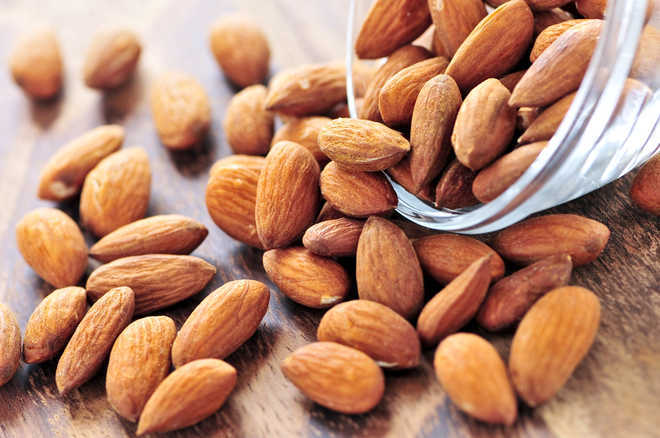NEW DELHI: Including almonds in the diet may significantly reduce the risk of cardiovascular disease among Indians, who are more prone to heart disorders than their European counterparts, the latest review of over 1,500 studies has found.
The systematic review by a panel of Indian experts in the field of nutrition and cardiovascular disease (CVD), published in the journal Nutrients, suggests that daily inclusion of almonds as part of a healthy diet can reduce dyslipidemia, one of the most important risk factors for cardiovascular disease among Indians.
Dyslipidemia is a condition marked by high LDL-cholesterol and triglyceride levels and low HDL cholesterol levels.
“Daily consumption of 45 grammes of almonds in any form (crushed, wholesome, or in snacks) can help reduce dyslipidemia,” Soumik Kalita, the lead author of the study, said.
“Typically, dietary strategies to reduce harmful LDL-cholesterol, such as decreasing saturated fat, also reduce beneficial HDL cholesterol, but that is not the case with almonds,” said Kalita, founder of Gurgaon-based FamPhy, a network of home visiting doctors.
He noted that the review of 16,97 publications is the first to quantify the relationship between almond intake and cardiovascular disease.
The review also included a study conducted in India that showed the inclusion of almonds in daily diets contributed towards reduced abdominal fat which is known to be a major factor in metabolic syndrome and ischemic heart disease (IHD).
Cardiovascular diseases account for 28 per cent of all deaths in India, more than any other cause. Due to their genetic makeup Southeast Asians – especially Indians – have a higher risk of cardiovascular disease, characterised by elevated levels of harmful LDL cholesterol and triglycerides and lower levels of beneficial HDL cholesterol, Kalita said.
Lack of physical activity, poor dietary habits such as diets rich in sugar, salt and saturated fats are responsible for several conditions such as abdominal obesity and insulin resistance which are now more common among Indians.
Coupled with these lifestyle factors and conditions, genetic propensity makes Indians much more prone to heart disease than their Caucasian counterparts, according to the review by researchers, including Shweta Khandelwal from Public Health Foundation of India in Gurgaon and Jagmeet Madan from SNDT Women’s University, Mumbai.
Kalita noted that it is a concern not for only those living in India, but also for Indians who live in other countries around the globe.
The systematic review examined the breadth of studies on almonds and blood lipid levels, showing that eating almonds results in significant reductions in total cholesterol and harmful LDL-cholesterol and triglyceride levels, while having no impact on beneficial HDL-cholesterol levels, said Kalita, who carried the review in collaboration with many other Indian nutrition and cardiovascular experts.
Numerous studies worldwide have shown that almonds have the potential to help improve blood cholesterol levels. The health benefits of almonds are thought to be due to their fat profile (predominantly mono- and poly-unsaturated fats ie good fats), antioxidant vitamin E, dietary fibre, and other important nutrients.
“To put it into perspective, cholesterol is not all bad. HDL, in fact, has protective properties and reduces the risk of heart disease. A large multi-centre study done in India estimated that nearly 72 per cent of Indians have low HDL-C levels,” Kalita said in the review commissioned by the Almond Board of California.
According to the Indian Heart Association, every 10-point increase in HDL-C may reduce the risk of heart disease by half. Many clinical studies, including those in the review and several among Indian populations specifically, have shown the role of almonds in lowering LDL-cholesterol levels.
“Studies have also looked at the effect of almonds on beneficial HDL cholesterol, with results showing that consumption of almonds can help maintain or even increase levels,” said Kalita.
Adding whole almonds to the diet is a practical nutritional strategy that can help manage dyslipidemia, and in turn, improve the cardiovascular health of Indians, the review concluded.
A study published last year found that including almonds in the diet may significantly reduce the risk of cardiovascular diseases in Indians with type 2 diabetes and improve their general health.




 Driving Naari Programme launched in Chandigarh
Driving Naari Programme launched in Chandigarh































